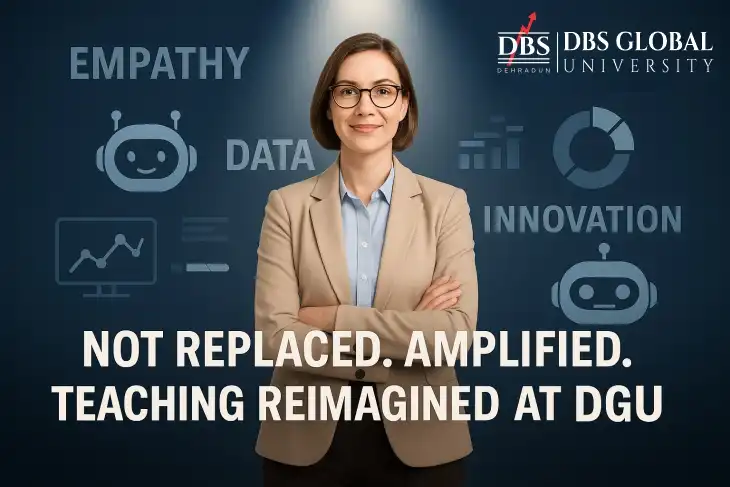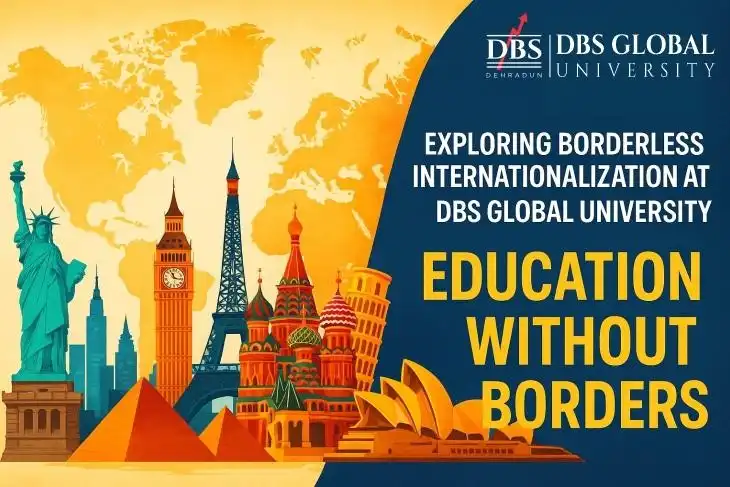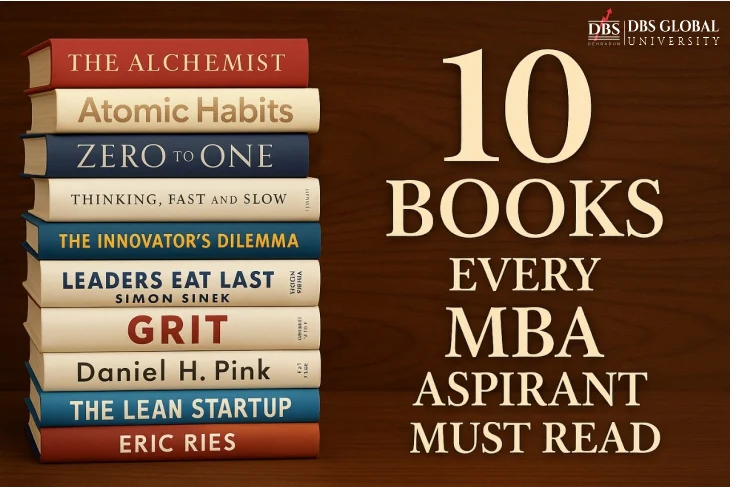
10 Books Every MBA Aspirant Must Read
admin
- 0
The MBA journey is intense. From complex case studies and demanding group projects to networking events and career planning, it’s a period of immense growth and transformation.
While textbooks will undoubtedly fill your shelves, there’s a wealth of wisdom in other genres that can profoundly shape your mindset, hone your skills, and inspire your path.
Here are 10 essential books that every MBA aspirant should add to their reading list, offering insights far beyond the traditional business curriculum:
1. The Alchemist – Paulo Coelho
The enchanting fable tells the story of Santiago, a young shepherd boy who journeys from his home in Andalusia to the Egyptian desert in search of a hidden treasure. More than a simple adventure, it’s a profound allegory about discovering one’s true destiny and the universal language of the world.
Your MBA secret weapon:
- •Your North Star: In the maze of career options, this book reminds you to chase your “Personal Legend,” not just the highest salary. It’s about aligning your career with your deepest purpose.
- •Embrace the Hustle: Understand that setbacks aren’t failures, but crucial steps on your path. Learn the grit needed to navigate the inevitable challenges of business.
- •Trust Your Gut (and Your Data): Develop the intuition to make decisive calls, even when the spreadsheets aren’t 100% clear. A crucial leadership trait often overlooked.
- •Impact Over Income: Shift your focus from just achieving “success” to finding profound meaning in what you do, a foundation for true fulfillment in leadership.
Example From the Book:
How to Use This in Real Life:
During your MBA, and certainly in your post-MBA career, you will encounter unexpected setbacks, a group project that goes sideways, a job interview that doesn’t pan out, or a business deal that collapses. Instead of seeing these as insurmountable failures, the lesson from Santiago is to adapt, learn, and persist. If a desired internship falls through, instead of giving up, look for alternative opportunities, perhaps in a related field, or even volunteer work that builds relevant skills. Just as Santiago diversified the crystal merchant’s business, you might pivot your job search strategy, network with different contacts, or even consider starting your own venture, using the “setback” as a catalyst for creative problem-solving and growth. It’s about finding new paths when the direct one is blocked, and often, these detours lead to even richer experiences and stronger skill sets.

2. AI 2041 – Kai-Fu Lee and Chen Qiufan
A groundbreaking work that combines the visionary insights of AI expert Kai-Fu Lee with the imaginative storytelling of sci-fi writer Chen Qiufan. Through ten compelling short stories, it paints a vivid picture of how AI will transform our world by 2041, exploring its profound impact on industries, daily life, and ethical dilemmas.
Your MBA secret weapon:
- •Future-Proof Your Strategy: Get a crystal-ball view into how AI will disrupt every industry. You will learn to anticipate market shifts, not just react to them.
- •Beyond the Hype: Forget abstract theories. These engaging narratives show you real-world AI applications in healthcare, finance, education, and beyond, giving you tangible examples for discussions.
- •Lead the AI Revolution: You don’t need to code, but you must speak the language of AI. This book provides the literacy to lead tech-driven teams and make informed decisions.
- •Navigate the Ethical Minefield: Grapple with the profound societal questions AI raises, preparing you for the critical, values-driven discussions that will define tomorrow’s business landscape.
Example From the Book:
How to Use This in Real Life:
As an MBA student, you’ll soon enter a workplace where AI is shaping hiring, marketing, logistics, and even leadership itself. This book shows you how to spot opportunities and risks that others miss. For example, during a class project on operations strategy, you can draw on the book’s ideas about predictive algorithms. In an ethics discussion, you might bring in insights from Lakshmi’s story to argue for AI-human collaboration. Most importantly, it teaches you that great leaders in the age of AI won’t just follow the data—they will challenge it, contextualize it, and use it to make more humane, forward-thinking decisions. This is how you future-proof your MBA.

3. Atomic Habits – James Clear
James Clear unpacks the science behind habit formation, revealing how tiny, incremental changes in your daily routine can lead to extraordinary long-term results. He provides a practical, actionable framework for building good habits, breaking bad ones, and mastering the small behaviors that compound into massive success.
Your MBA secret weapon:
- •Conquer MBA Rigor: Learn to build bulletproof study routines, manage your time effectively, and make consistent progress on demanding projects – even when motivation dips.
- •Ditch Bad Habits (Forever): Identify and eliminate time-wasting behaviors that derail productivity. Say goodbye to procrastination and hello to efficiency.
- •Systemize Your Success: Stop chasing fleeting goals and start building robust systems that make success inevitable. This mindset shift is invaluable for any business leader.
- •The Compounding Advantage: Understand how small, consistent actions, whether in networking, learning, or self-improvement, accumulate into exponential growth for your career.
Example From the Book:
Clear shares the story of British Cycling. For decades, the team had mediocre results—until a new coach focused on marginal gains: improving seats, handwashing, even sleep quality. These tiny 1% improvements were compounded into Olympic golds and Tour de France victories. The takeaway? Big wins are built on small, consistent changes.
How to Use This in Real Life:
In your MBA journey, it’s not the all-nighters that define your success—it’s the daily 30-minute review, the habit of reaching out to one new person weekly, the consistent use of to-do lists and feedback loops.
- •Want to be better at public speaking? Practice 5 minutes a day.
- •Want to stay fit amid deadlines? Stack your workouts onto your morning routine.
Start small, stay consistent, and let habits do the heavy lifting. Like investing in SIPs, your micro-actions today will compound into macro-success tomorrow.

4. Thinking, Fast and Slow – Daniel Kahneman
Nobel laureate Daniel Kahneman takes you on a fascinating journey through the two systems that drive our thinking: “System 1” (fast, intuitive, emotional) and “System 2” (slow, deliberate, logical). He exposes the cognitive biases that often lead us astray, offering profound insights into human judgment and decision-making.
Your MBA secret weapon:
- •Decisions, Decisions, Decisions: Master the art of strategic thinking by understanding how you and others truly make choices – crucial for analyzing complex business problems.
- •Bias-Proof Your Brain: Learn to spot and mitigate the cognitive biases that can sabotage even the smartest strategies. Make data-backed calls, not just gut feelings.
- •Negotiate & Persuade Like a Pro: By understanding the human mind’s inner workings, you’ll gain an undeniable edge in influencing stakeholders, closing deals, and leading effectively.
- •Supercharge Your EQ: Develop a heightened awareness of your own thought processes and the biases influencing those around you, a hallmark of emotionally intelligent leaders.
Example From the Book:
How to Use This in Real Life:
During your MBA, you will be flooded with data, opinions, and pressure to make fast decisions—whether in case discussions, pitch presentations, or investment simulations. Kahneman teaches you to pause, reflect, and check for hidden biases before jumping to conclusions. For instance, when evaluating a startup pitch, don’t let a charismatic founder or impressive numbers sway you too quickly. Dig deeper. Engage System 2.
In team dynamics, understanding how people react emotionally (System 1) vs. rationally (System 2) helps you manage conflicts, facilitate smarter debates, and lead with clarity. Ultimately, this book is a mental toolkit for thinking better—something every MBA needs in and beyond the classroom.

5. Crucial Conversations – Joseph Grenny, Kerry Patterson, Ron McMillan, Al Switzler & Emily Gregory
This practical guide offers a step-by-step approach to navigating high-stakes, emotionally charged conversations. It teaches you how to speak persuasively, listen effectively, and resolve disagreements in ways that build respect and trust, even when opinions diverge sharply.
Your MBA secret weapon:
- •Master the Boardroom Battle: Learn to confidently handle those intense, high-pressure dialogues – whether it’s a difficult client, a challenging team member, or a critical performance review.
- •Forge Unbreakable Teams: Resolve conflicts, give tough feedback, and build stronger relationships within your future teams. Essential for anyone aspiring to management.
- •Communicate Under Fire: Develop the composure and clarity to articulate your point when the stakes are highest. This is a top-tier leadership skill B-schools crave.
- •Negotiate, Don’t Capitulate: Gain frameworks to stay calm, listen deeply, and advocate for your position without damaging rapport – invaluable for any MBA grad.
Example From the Book:
One story in the book recounts a manager who needs to confront a high-performing employee whose attitude is damaging team morale. Instead of avoiding the issue or attacking the person, the manager uses “STATE” skills to open up a non-defensive dialogue. The conversation not only salvages the relationship but also resets the team culture.
- •S – Share facts
- •T – Tell your story
- •A – Ask for others’ paths
- •T – Talk tentatively
- •E – Encourage testing
How to Use This in Real Life:
In your MBA journey, you will face group tension, clashing viewpoints, or even difficult professors or clients. Rather than avoiding the friction, crucial conversations teaches you how to lean into it with structure and empathy. For example, if a teammate isn’t pulling their weight, instead of silently resenting them (or blowing up), use this book’s framework to calmly address the issue, listen to their side, and co-create a solution. Later, in job interviews or leadership roles, the ability to handle tough conversations with grace and impact becomes a differentiator. This book is your toolkit for becoming the kind of leader who doesn’t just win arguments—but earns trust.
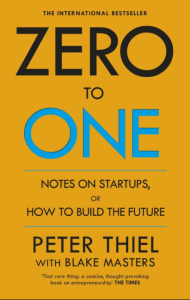
6. Zero to One – Peter Thiel and Blake Masters
Peter Thiel, legendary co-founder of PayPal and Palantir, challenges the conventional wisdom of “startup success.” He argues that true innovation comes from creating something entirely new (“zero to one”), rather than merely copying or optimizing existing ideas. This book is a provocative blueprint for visionary entrepreneurship and monopolistic value creation.
Your MBA secret weapon:
- •Unleash Your Inner Innovator: Don’t just follow trends. This book ignites the entrepreneurial spirit, teaching you to create truly novel solutions and carve out new markets.
- •First Principles Thinking: Learn to dissect complex problems and rebuild them from the ground up, a powerful strategic tool for tackling any business challenge.
- •Silicon Valley Unplugged: Gain unfiltered, real-world insights from one of tech’s most influential minds on what it really takes to build a successful, impactful company.
- •Beyond Competition: Discover why creating unique value (monopoly-like thinking) is far more potent than battling in crowded, competitive markets. This redefines your approach to strategy.
Example From the Book:
Thiel explains how PayPal succeeded not by being “just another payments company,” but by dominating a small niche first—online transactions for eBay sellers. From there, it scaled. The lesson? Start small, win big. Don’t aim to be the “best,” aim to be the only.
How to Use This in Real Life:
In your MBA, you’ll be tempted to play it safe—follow proven paths, analyze case studies, pursue well-worn roles. Zero to One pushes you to ask bolder questions. For example, in an entrepreneurship elective or pitch competition, apply Thiel’s principles:
- •Is your idea 10x better than anything else?
- •Is it defensible?
- •Does it open a new market?
Even in corporate strategy, this book reshapes how you evaluate opportunities. Don’t just optimize—imagine. Whether you’re building a startup or leading innovation in a Fortune 500 firm, Zero to One is a playbook for daring, original thinkers.

7. Building a StoryBrand – Donald Miller
Donald Miller reveals a powerful, seven-part framework that helps businesses clarify their message so customers listen. He argues that people don’t buy products or services; they buy solutions to their problems and roles in a compelling story. This book shows you how to position your brand as the “guide” that helps customers achieve their goals.
Your MBA secret weapon:
- •Cut Through the Noise: Learn to articulate your value proposition with razor-sharp clarity. Essential for pitching ideas, products, or even yourself in a crowded market.
- •Marketing That Moves People: Transform your understanding of marketing by learning to craft narratives that emotionally connect with your audience and drive action.
- •Customer-Obsessed Thinking: Shift your entire mindset from “what we offer” to “how we heroically solve problems for our customers.” The ultimate customer-centric approach.
- •Your Personal Brand, Perfected: Use this framework to powerfully tell your story in job interviews, on LinkedIn, and during networking events. Make yourself unforgettable.
Example From the Book:
Miller shares the example of a gym that revamped its messaging from “state-of-the-art equipment and facilities” to “Get strong. Gain confidence. Join a community that pushes you.” Sales skyrocketed—not because the gym changed, but because the story did. The lesson: clarity and empathy sell.
How to Use This in Real Life:
During your MBA, you will be pitching ideas constantly—in competitions, marketing classes, group presentations, and job interviews. Instead of focusing on features or credentials, use StoryBrand to answer:
- •What problem are you solving?
- •How are you guiding others to success?
- •What transformation are you promising?
For example, in a consulting project, instead of saying “We offer data-driven insights,” say: “We help companies regain lost market share through clear, actionable analytics.” That’s storytelling that sells. Whether you are building a business or just building you, this book teaches you to frame your message like a blockbuster script—making sure your audience sees themselves as the hero and you as the answer.
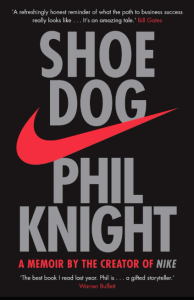
8. Shoe Dog – Phil Knight
This raw, deeply personal memoir chronicles the improbable, often chaotic, journey of Phil Knight from a restless young man borrowing $50 from his father to creating Nike, one of the world’s most iconic and profitable brands. It’s a gritty, honest look at entrepreneurship, resilience, and the relentless pursuit of a dream.
Your MBA secret weapon:
- •The Unfiltered Startup Story: Forget the gloss. This is a rare, honest look at the doubts, failures, and sheer grit behind building a global empire from scratch.
- •Built for Resilience: Witness firsthand that success is never linear. This book is a masterclass in navigating financial crises, supply chain nightmares, and relentless competition.
- •From Concept to Global Brand: Gain panoramic insights into everything from securing funding and managing supply chains to pioneering sports marketing and global expansion.
- •Leadership with Heart: Phil Knight’s humility and unwavering commitment resonate deeply, offering a relatable and inspiring blueprint for anyone dreaming of building something truly big.
Example From the Book:
One of the most powerful moments is when Nike faces a catastrophic cash crisis. Banks won’t lend, suppliers are threatening to cut ties, and the company is teetering. Yet Knight and his scrappy team find unconventional ways to stay afloat—through trust, risk, and relentless hustle. Instead of giving up, they bet bigger. That gamble eventually paid off with Nike’s IPO.
How to Use This in Real Life:
During your MBA, you’ll face moments when you feel completely out of your depth—whether it’s an impossible group deadline, a failed interview, or a business simulation gone wrong. Shoe Dog reminds you: that’s normal. Real success often looks messy in the middle. It also teaches you to take bold bets. Knight didn’t start with a perfect plan—he started with a belief in great shoes and figured it out along the way. Whether you are launching a startup, pitching a new idea in a corporate setting, or just deciding to take the harder path, Shoe Dog gives you the courage to act—even when the outcome is uncertain.

9. Hidden Potential – Adam Grant
Bestselling author Adam Grant challenges the conventional wisdom about talent, arguing that greatness isn’t solely about innate ability, but about how we grow. Through compelling stories and cutting-edge research, he reveals how to unlock untapped potential in ourselves and others, focusing on character skills, learning environments, and the power of progress.
Your MBA secret weapon:
- •Growth Mindset on Steroids: Ditch the myth that “talent is everything.” This book empowers you to believe in your own and others’ capacity for immense growth, even beyond current limitations.
- •Master the Learning Curve: Embrace setbacks and failures not as roadblocks, but as essential fuel for progress. This resilience is vital for navigating the MBA and post-MBA world.
- •Lead for Latent Greatness: Learn how to identify, nurture, and elevate the “hidden potential” in your future teams, fostering a culture where everyone can thrive.
- •Beyond the Labels: Challenge your own assumptions and those of others. This book helps you see beyond test scores and past performance to the true, untapped capabilities within.
Example From the Book:
Grant shares the story of a struggling student who floundered early in math, labeled “slow,” yet went on to become a top-performing engineer—because of a mentor who invested in building his confidence, not just his skills. That intervention rewrote the student’s narrative—and trajectory. For MBAs, it’s a reminder that great coaching and feedback can change lives.
How to Use This in Real Life:
During your MBA, you may encounter impostor syndrome, especially when surrounded by high-achievers. Let this book remind you: potential isn’t fixed—it’s revealed over time, with effort. Use this mindset when facing tough subjects, interviews that don’t go as planned, or career pivots that feel uncertain. And when you’re leading teams—whether in a class project or post-MBA career—look for the “hidden potential” in others. Be the person who sees the future performer in today’s struggler. That’s not just good leadership—it’s transformational leadership.

10. How to Win Friends and Influence People – Dale Carnegie
A timeless classic that has empowered millions, Dale Carnegie’s masterpiece distills the principles of human relations into practical, actionable advice. It teaches you how to be a better listener, a more effective communicator, and how to genuinely connect with people to build lasting influence and positive relationships.
Your MBA secret weapon:
- •Unlock Networking Superpowers: Learn the enduring principles of empathy, persuasion, and genuine connection to build a powerful network with peers, mentors, and future clients.
- •Win Without the War: Master the art of gaining cooperation and agreement without resorting to conflict. An invaluable skill for leadership, negotiations, and team dynamics.
- •Emotional Intelligence, Mastered: This book is a foundational text for developing crucial soft skills: Active listening, Sincere appreciation, Understanding diverse perspectives.
- •Influence, Ethically: Whether in group projects, client presentations, or boardroom discussions, this book gives you the tools to connect with people effectively and lead by example.
Example From the Book:
A key story in the book is about Charles Schwab, who famously boosted productivity not by scolding workers but by praising progress. In one instance, he wrote a production number on the floor in chalk, sparking healthy competition among shifts. No threats. No yelling. Just psychology and people skills. MBA takeaway? Influence isn’t about power—it’s about people.
How to Use This in Real Life:
During your MBA, you’re constantly presenting, collaborating, networking, and interviewing. This book becomes your people-skills playbook. Instead of pushing your agenda, learn to listen first. Instead of proving you’re right, find ways to inspire agreement. Apply these principles in group projects by fostering harmony. Use them in networking conversations to leave a lasting impression. And when you’re managing teams post-MBA, use them to motivate—not mandate—performance. In short, this book is your shortcut to being both liked and respected.
Conclusion
An MBA is more than just lectures, grades, or chasing placements; it is the time to rewire how you think, lead, and grow. While the classroom teaches you frameworks and tools, these books offer something deeper: mindset shifts, real-world insights, and lessons you will carry long after graduation.
Each book on this list has the potential to challenge you, ground you, or push you forward, sometimes all at once. You don’t have to read them all at once. Start with the one that speaks to where you are right now.
Let it sit with you, shape your thinking, and influence how you show up, not just as a student, but as a leader of the future.
FAQ: Essential Books for Your MBA Journey
Q1: I’m starting my MBA in a few months. Which 2-3 books from this list are the most critical to read first?
A: For a powerful head start, we recommend a foundational trio:
- Atomic Habits: To build the study routines and productivity systems you’ll need to manage the intense workload from day one.
- How to Win Friends and Influence People: To master the networking and team collaboration that are central to the MBA experience.
- Thinking, Fast and Slow: To train your brain for the strategic decision-making and case study analysis you’ll encounter in the classroom.
Q2: How do these books specifically help with MBA interviews and securing a high-paying job?
A: These books provide a significant competitive edge. Crucial Conversations prepares you to handle tough behavioral questions with grace. Building a StoryBrand helps you craft a compelling personal narrative about your career pivot. Zero to One and AI 2041 give you unique, forward-thinking insights to discuss industry trends, showing interviewers you’re a strategic thinker, not just a student.
Q3: This list includes fiction (The Alchemist) and a memoir (Shoe Dog). How valuable are they, as valuable as business theory books?
A: While theory teaches you what to do, these books teach you why and how to persevere. The Alchemist is a powerful tool for maintaining motivation and ensuring your career choices align with your personal values, which is crucial for long-term fulfillment. Shoe Dog provides an unfiltered look at the real-world grit, resilience, and operational challenges of building a business lessons rarely captured in a textbook.
Q4: I want to go deeper into the concepts in these books. Does DGU offer any related courses?
A: Absolutely! At DGU, we believe in bridging the gap between inspirational reading and practical application. Many of the concepts in these books are directly integrated into our curriculum. For instance:
- The strategic frameworks in Zero to One are explored in our Entrepreneurship & Innovation courses.
- The psychological principles from Thinking, Fast and Slow underpin our Negotiation and Decision-Making workshops.
- The leadership and communication skills from Crucial Conversations are core to our Leadership Development Program.
You can explore all our course offerings designed to turn these insights into actionable skills on our [DGU Courses page].
Q5: With the rapid rise of AI, is a book like AI 2041 really more relevant than a classic economics text?
A: For a modern leader, understanding AI’s trajectory is becoming as fundamental as understanding economics. While economic principles provide context, AI 2041 equips you for the future context in which those principles will be applied. It helps you anticipate disruption, identify new business models, and navigate the ethical dilemmas that will define the next decade, making you a more future-proof and valuable graduate.
Because staying ahead isn’t just about doing more. It’s about learning better, thinking deeper, and leading smarter.


